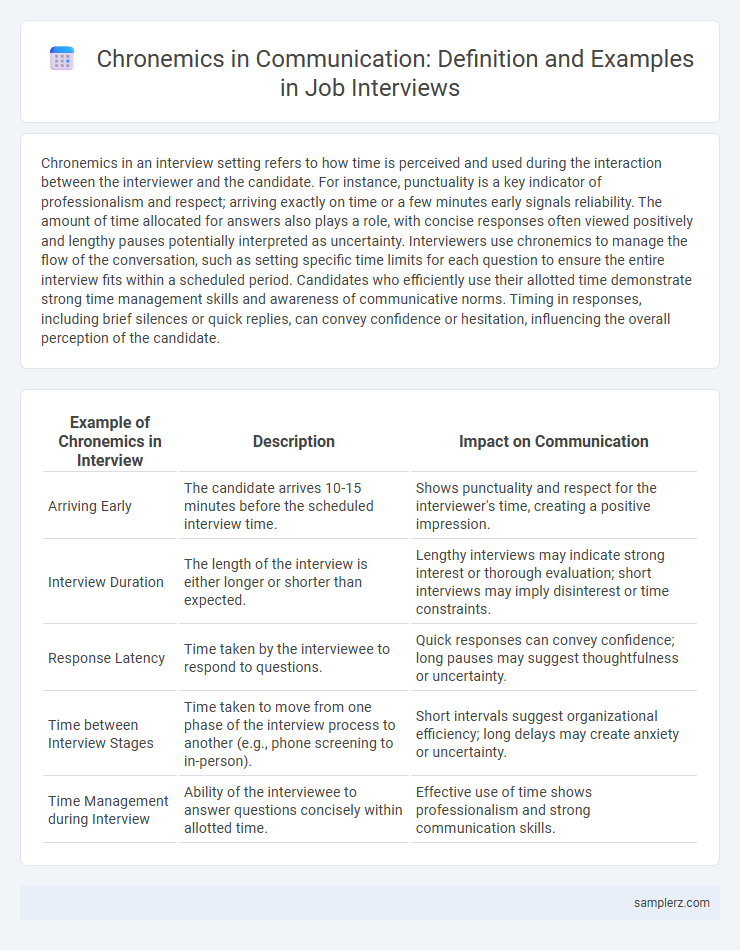Chronemics in an interview setting refers to how time is perceived and used during the interaction between the interviewer and the candidate. For instance, punctuality is a key indicator of professionalism and respect; arriving exactly on time or a few minutes early signals reliability. The amount of time allocated for answers also plays a role, with concise responses often viewed positively and lengthy pauses potentially interpreted as uncertainty. Interviewers use chronemics to manage the flow of the conversation, such as setting specific time limits for each question to ensure the entire interview fits within a scheduled period. Candidates who efficiently use their allotted time demonstrate strong time management skills and awareness of communicative norms. Timing in responses, including brief silences or quick replies, can convey confidence or hesitation, influencing the overall perception of the candidate.
Table of Comparison
| Example of Chronemics in Interview | Description | Impact on Communication |
|---|---|---|
| Arriving Early | The candidate arrives 10-15 minutes before the scheduled interview time. | Shows punctuality and respect for the interviewer's time, creating a positive impression. |
| Interview Duration | The length of the interview is either longer or shorter than expected. | Lengthy interviews may indicate strong interest or thorough evaluation; short interviews may imply disinterest or time constraints. |
| Response Latency | Time taken by the interviewee to respond to questions. | Quick responses can convey confidence; long pauses may suggest thoughtfulness or uncertainty. |
| Time between Interview Stages | Time taken to move from one phase of the interview process to another (e.g., phone screening to in-person). | Short intervals suggest organizational efficiency; long delays may create anxiety or uncertainty. |
| Time Management during Interview | Ability of the interviewee to answer questions concisely within allotted time. | Effective use of time shows professionalism and strong communication skills. |
Understanding Chronemics: Time’s Role in Interview Communication
Chronemics in interviews reveals how time influences communication, such as punctuality signaling professionalism or delays indicating disorganization. The length of responses and pauses during exchanges also affect perceptions of confidence and engagement. Interviewers and candidates alike use time management to convey respect and control the conversational flow.
Punctuality as a Reflection of Professionalism
Punctuality in an interview serves as a critical example of chronemics, signaling a candidate's respect for others' time and commitment to professionalism. Arriving exactly on time demonstrates reliability and organizational skills, influencing the interviewer's perception positively. Consistent punctuality often predicts strong workplace discipline and effective time management.
The Impact of Response Time During Interview Questions
Response time in interviews significantly influences communication effectiveness and candidate evaluation. Longer pauses before answering often indicate careful thought or uncertainty, while rapid responses can suggest confidence and preparedness. Interviewers subconsciously assess these timing cues to gauge candidates' communication skills, composure, and decision-making abilities.
Managing Speaking Duration for Effective Impressions
Managing speaking duration during an interview exemplifies chronemics by influencing how candidates are perceived regarding confidence and professionalism. Speaking too briefly may suggest a lack of preparation, while excessively long responses can indicate poor time management or nervousness. Optimal timing balances thoroughness and conciseness, enhancing communication effectiveness and creating a positive impression on interviewers.
Turn-Taking and Timing Cues in Interview Dialogue
Turn-taking in interview dialogue ensures clear communication by allowing each participant to speak without interruption, signaling respect and attentiveness. Timing cues such as pauses and response latencies indicate a candidate's thoughtfulness and confidence, influencing the interviewer's perception. Effective management of chronemics enhances mutual understanding and fosters a professional atmosphere throughout the interview process.
Scheduling Interviews: What Timing Signals Convey
Scheduling interviews communicates respect for candidates' time and sets a professional tone, with prompt responses signaling organization and reliability. Delays or last-minute changes can convey disinterest or disorganization, affecting candidate perceptions. Consistent adherence to agreed-upon times demonstrates commitment and establishes trust in the interview process.
Pauses and Silence: Power Moves in Interview Communication
Pauses and silence function as strategic tools in interview communication, signaling confidence and control. Effective use of silence allows interviewees to gather thoughts, prompting interviewers to reveal additional information or clarify questions. Mastery of these chronemic cues enhances perceived professionalism and influences the interview's power dynamics.
Cross-Cultural Variations in Chronemics within Interviews
Cross-cultural variations in chronemics significantly influence interview dynamics by affecting perceptions of punctuality, silence, and response timing. In cultures like Japan, strict adherence to scheduled interview times reflects respect and professionalism, while in Latin American contexts, a more flexible approach to timing is common and accepted. Understanding these differences enhances effective communication and reduces misunderstandings during international or intercultural interviews.
Time Allocation between Candidate and Interviewer
In interviews, chronemics plays a crucial role as time allocation between the candidate and interviewer reflects communication dynamics. Interviewers often control the duration of responses, signaling importance and managing the flow of information, while candidates use pacing to demonstrate confidence or hesitation. Effective time management impacts perception, influencing rapport and the overall impression formed during the hiring process.
The Effect of Ending an Interview Early or Late
Ending an interview early can create a perception of disinterest or disorganization, negatively impacting the candidate's impression. Conversely, extending an interview beyond the scheduled time may signal strong interest and engagement, promoting a positive communication climate. The strategic use of chronemics in managing interview duration influences rapport and the overall effectiveness of interpersonal interaction.

example of chronemics in interview Infographic
 samplerz.com
samplerz.com